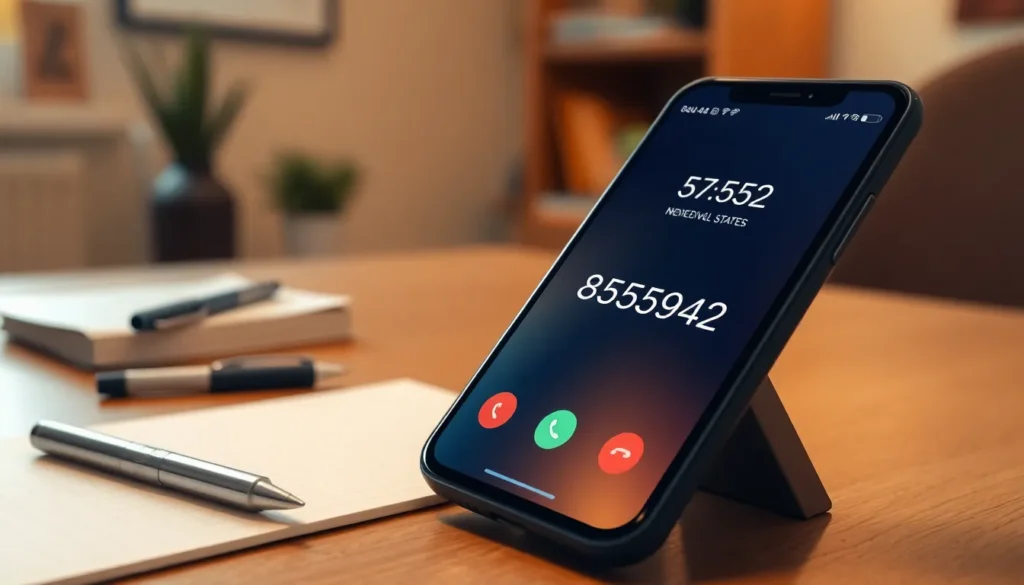Table of Contents
ToggleIn a world where attention spans are shorter than a goldfish’s, mobile apps need to stand out like a flamingo in a flock of pigeons. Enter marketing automation—your trusty sidekick in the quest for user engagement and retention. Imagine having a tool that works tirelessly behind the scenes, sending personalized messages and push notifications while you sip your coffee. Sounds dreamy, right?
Overview of Marketing Automation for Mobile Apps
Marketing automation simplifies the process of engaging users within mobile applications. It enables app developers to run targeted campaigns based on user behavior and preferences. Personalized messaging is a core component, allowing companies to deliver relevant content to individual users.
Analytics play a significant role in this automation. Mobile apps can track user interactions, revealing key insights about user preferences and habits. Data-driven decisions become possible, optimizing marketing strategies to increase user retention and engagement rates.
Push notifications represent one effective tool in a marketing automation strategy. By sending timely alerts about new features or promotions, developers foster ongoing user interaction. Emails also provide a platform for engaging users, informing them about updates and exclusive offers.
User segmentation enhances marketing efforts. Dividing users into groups based on behavior improves the relevance of communications. Targeted messages lead to higher response rates, driving user actions that benefit the app’s growth.
Integrating social media into marketing automation amplifies reach. Users can share their experiences, attracting new users and increasing brand awareness. The synergy between app messaging and social platforms cultivates a community around the app.
Automated A/B testing supports continuous improvement. Developers can experiment with different messaging styles or promotional offers. Insights from these tests guide adjustments, refining outreach for better results.
Ultimately, marketing automation acts as a vital ally for mobile apps in a competitive landscape. By leveraging technology, companies enhance user engagement and ensure long-term success.
Key Benefits of Marketing Automation

Marketing automation offers several advantages that enhance mobile app success. It significantly boosts user engagement by streamlining communication and providing timely, relevant content tailored to individual preferences.
Improved User Engagement
User engagement becomes more dynamic thanks to personalized content delivery. Segmenting users based on behavior allows for push notifications and messages that resonate with their interests. Personalized communication drives higher interaction rates, keeping users invested. Automated responses ensure timely engagement, eliminating the risk of losing user interest due to delayed interactions. With consistent follow-ups, developers can maintain a strong connection with users, fostering loyalty and encouraging regular app usage.
Enhanced Targeting Capabilities
Targeting capabilities expand as marketing automation leverages data insights. By analyzing user behavior, it facilitates customized marketing campaigns that address specific user needs. Advanced segmentation allows for precise targeting based on demographics, preferences, and usage patterns. Developers can experiment with different messaging techniques to identify what resonates most, ensuring effective outreach. Automated testing of marketing strategies leads to continuous refinement, thus optimizing results and maximizing return on investment.
Popular Marketing Automation Tools for Mobile Apps
Numerous tools streamline marketing automation for mobile apps. Focusing on the right features makes a significant difference in user engagement and retention.
Tool Features to Consider
Choose tools that offer robust analytics, enabling the tracking of user interactions. Look for customizable push notifications, which allow targeted messaging based on user behavior. Consider A/B testing capabilities, supporting the experimentation of different messaging styles. Integration with social media enhances reach and fosters community engagement. Additionally, user segmentation features improve the relevance of campaigns by tailoring messages to specific demographics.
Comparison of Leading Tools
Many tools specialize in mobile app marketing automation. Firebase provides analytics and A/B testing, making it a popular choice for developers. Braze excels at personalized messaging and user segmentation, enhancing targeted campaigns. Adjust.io stands out for its flexible automation workflows, allowing tailored user experiences. Airship combines push notifications with deep linking features, improving user interaction rates. Each of these tools offers distinct strengths, ensuring that app developers find solutions that meet their specific marketing needs.
Best Practices for Implementing Marketing Automation
Implementing effective marketing automation for mobile apps requires careful consideration of various factors.
Data Privacy and Compliance
Understanding data privacy regulations is crucial. Mobile app developers must ensure compliance with laws like GDPR and CCPA when handling user data. Protecting user data builds trust and fosters long-term relationships. Transparency in how data is collected and used encourages user engagement. Developers should obtain explicit consent through clear opt-in processes. Regular audits strengthen compliance efforts, identifying potential vulnerabilities. Utilizing secure data storage solutions further protects sensitive information. Staying informed about evolving regulations ensures that marketing strategies remain compliant. By prioritizing data privacy, companies not only meet legal obligations but also enhance their brand reputation.
Continuous Optimization Strategies
Continuous optimization is essential for successful marketing automation. Regularly analyzing campaign performance provides actionable insights. A/B testing different messaging strategies enables developers to identify the most effective content. Leveraging analytics tools to track user interactions helps refine target audiences. Segmenting users based on behavior and preferences enhances communication relevance. Utilizing feedback loops allows for real-time adjustments to marketing efforts. Integrating social media insights can improve engagement rates and expand reach. Prioritizing ongoing education and training for teams keeps them updated on industry trends. Implementing these strategies ensures that marketing campaigns evolve and adapt to changing user needs.
Marketing automation is essential for mobile apps striving to thrive in a competitive landscape. By leveraging personalized messaging and targeted campaigns, developers can significantly enhance user engagement and retention. The ability to analyze user behavior allows for data-driven decisions that optimize marketing strategies.
With tools that offer robust analytics and seamless integration, app developers can refine their approach and ensure timely, relevant content reaches their audience. Prioritizing data privacy and continuous optimization not only strengthens user trust but also fosters long-term loyalty. Embracing marketing automation equips mobile apps with the necessary resources to stand out and succeed in an ever-evolving market.




